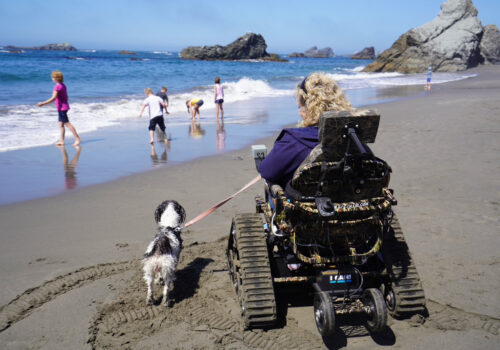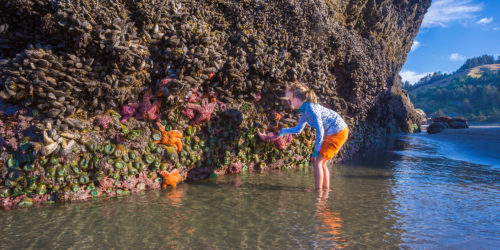- When do the whales migrate along the Oregon Coast?
-
December through early February on their annual 6,000 mile journey in the Pacific Ocean from the Arctic to the warm waters of Baja CA. Then, during March through October, the whales return north with their calves. Check out this website for more information: www.WhaleSpoken.org
- What is considered the North / Central / Southern Region(s) of the Oregon Coast?
-
North starts from Astoria to Lincoln City. Central goes from Lincoln City to Florence. South begins in Florence and continues all the way to Brookings – Harbor.
- How can I find out more about road conditions?
-
You can contact the Oregon Transportation Department at: 503-889-3999 or toll free 1-800-977-6368. You can also check out their web site at www.tripcheck.com.
- What is the weather like?
-
In spring – temperatures range from high 50’s during day to low 40’s at night with a good chance of rain. In summer – temperatures range from 60-70’s during day to high 50’s at night. In autumn – temperatures range from mid/high 60’s during day to low 40’s at night. There is a good chance of rain in late autumn early winter. In winter- temperatures range from mid/high 40’s to low 50’s during day to mid 30’s at night. Winter is a great time to visit the Oregon coast and watch our magnificent winter storms.
- What should we wear?
-
We always recommend that you dress in layers. During the summer we suggest shorts, light shirts along with a windbreaker. Those traveling from really warm climates might want something a little warmer. Fall it will be cooler in the evening so something a little warmer would be appropriate. In the winter be sure to dress warmly and bring your winter jacket along. Umbrellas, although sometimes used, are not really recommended along the coast because of the strong winds. It tends to turn the umbrella inside out. Be sure to check out our “What is the weather like” section for temperatures and dress accordingly. Remember, there is no such thing as bad weather, just inadequate clothing.
- How long does it take to drive the entire Oregon Coastline (no stops)?
-
Approximately 10-12 hours. The average driving speed along the coast will be approximately 50 mph.
- How far is it from Portland to:
-
- Astoria via Hwy 30 is approximately 2 hrs (96 miles)
- Seaside via Hwy 26 is approximately 1 1/2 hrs (79 miles)
- Cannon Beach via Hwy 26 is approximately 1 1/2 hrs (79 miles)
- Nehalem Bay via Hwy 26 is approximately 2 hrs (84 miles)
- Garibaldi via Hwy 26 to Hwy 6 to Hwy 101 is approximately 1 3/4 hrs (90 miles)
- Tillamook via Hwy 26 to Hwy 6 is approximately 1 1/2 hrs (74 miles)
- Lincoln City on Hwy 99 then to Hwy 18 is approximately 2 hrs (88 miles)
- Depoe Bay via Hwy 99 then to Hwy 18 is approximately 2 ¼ hrs (103 miles)
- Newport via I-5 to Hwy 20 is approximately 3 hrs (114 miles)
- Toledo via I-5 to Hwy 20 is approximately 2 ¾ hrs (107 miles)
- Waldport via I-5 to Hwy 34 is approximately 3-1/2 hrs (136 miles)
- Yachats via I-5 to Hwy 34 is approximately 3 ¾ hrs (146 miles)
- Florence via I-5 to Hwy 126 is approximately 3 hrs (164 miles)
- Reedsport / Winchester Bay via I-5 to Hwy 38 is approximately 4 hrs (185 miles)
- Coos Bay via I-5 to Hwy 38 is approximately 5 hrs (212 miles)
- Gold Beach via I-5 South to Hwy 38 to Hwy 101 South is approx. 6 hrs (290 miles)
- Bandon via I-5 to Hwy 42 approximately 5-1/2 hrs (236 miles)
- Brookings – Harbor via I-5 to Hwy 126 to Hwy 101 is approx. 7 1/2 hrs (320 miles)
- What is the driving distances between each city on the coast?
-
- Astoria to Seaside – 17 miles
- Seaside to Cannon Beach – 9 miles
- Cannon Beach to Nehalem Bay – 21 miles
- Nehalem Bay to Rockaway Beach – 1 mile
- Rockaway Beach to Tillamook – 15 miles
- Tillamook to Lincoln City – 44 miles
- Lincoln City to Depoe Bay – 13 miles
- Depoe Bay to Newport – 13 miles
- Newport to Toledo – 6 miles
- Newport to Waldport – 16 miles
- Waldport to Yachats – 9 miles
- Yachats to Florence – 26 miles
- Florence to Reedsport – 21 miles
- Reedsport to Winchester Bay – 5 miles
- Winchester Bay to Coos Bay/North Bend – 23 miles
- Coos Bay/North Bend to Bandon – 24 miles
- Bandon to Port Orford – 27 miles
- Port Orford to Gold Beach – 28 miles
- Gold Beach to Brookings – 29 miles
- Are Oregon’s beaches all open to the public?
-
From an aerial view, the Oregon Coast is a series of long stretches of sandy beaches interspersed by rugged headlands. These beaches were first protected for public use by Governor Oswald West (in office 1911-15). In 1967 Governor Tom McCall (in office 1967-75) assisted in the passage of the Oregon Beach Bill to maintain West’s vision in keeping Oregon’s beaches open to the public. The Oregon Beach Bill decreed that all land within sixteen vertical feet of the average low tide mark belongs to the people of Oregon and guarantees that the public has free and uninterrupted use of the beaches along Oregon’s 363 miles of coastline. A state easement exists up to the line of vegetation. Only one other state, Hawaii, guarantees public access from the surf line to the vegetation line. The Beach Bill also directed that the ocean shore be administered as a state recreation area. The Oregon Parks and Recreation Department is charged with the protection and preservation of the recreation, scenic, and natural resource values found on Oregon’s ocean shore.
- Can I have a fire on the beach?
-
Use small pieces of wood only. Large logs are prohibited. The fire must be west of the vegetation line, NO EXCEPTIONS. Build your fire away from the beach grass & piles of driftwood. Extinguish the fire with water. Don’t just bury it. Doing this will allow the fire to remain hot and continue to smolder for hours. This could also cause someone to get burned.
- Where can you go crabbing and clamming along the coast?
-
Most marine zones (consisting of the Pacific Ocean, coastal bays and beaches) are open year round, 24 hours a day except as special regulation apply. The ocean is closed for Dungeness crab Aug. 15 – Nov. 30. No taking is allowed for Oysters.
There is a small fee to harvest non-commercial shellfish and marine invertebrates; check the local bait and tackle shops or marinas for more information. Regulations are subject to change each year, be sure to consult the Shellfish Section/Marine Zone of the current Oregon Sport Fishing Regulations for seasons, limits and open areas. Regulation books are available free of charge where angling and hunting licenses are sold. For more information contact Marine Resource Program – 3406 Cherry Avenue N.E., Salem, OR 97303, or call 503-947-6000 or 800-720-6339 or visit their website.
A 24-hour hotline is available for paralytic shellfish poisoning reports at (503) 986-4728. You can, but the Oregon State Parks have very strict rules. We also suggest you check the regulations of the individual beach you are visiting. Any specific rules for that beach will be posted at its entrance.
- Can you drive on the beach?
-
There are places along the Oregon Coast where you are allowed to drive on the beach. Some of these places are restricted to certain times of the year. The information of when and where there is beach vehicle accessibility can be found on the left side of the Official Oregon State map put out by the Oregon Department of Transportation (ODOT) – Contact (503) 986-4000 for a copy of the map. Website.
- Are dogs allowed on the beach?
-
Dogs are allowed on the beach, and most places require them to be on a leash. Individual beach regulations will be posted at beach access. Please remember to be a responsible pet owner regarding cleaning up after your pet so our beautiful Oregon coast beaches can be enjoyed by all.
- Is overnight camping allowed on Oregon Coast beaches?
-
Overnight camping is allowed on sections of the Oregon Coast, not adjacent to Oregon State Parks, not within the city limits of Cannon Beach, Lincoln City, Seaside, Newport, Bandon, Gold Beach, Rockaway Beach and Manzanita. This includes overnight sleeping in tents, driftwood shelters, sleeping bags, recreational vehicles, trailers, or automobiles, nor where there are signs posted prohibiting camping. The places where one can camp on the beach tend to be remote, far from the road and not accessible by automobile.
North Coast
Central Coast
South Coast
Explore
Coos Bay, OR



